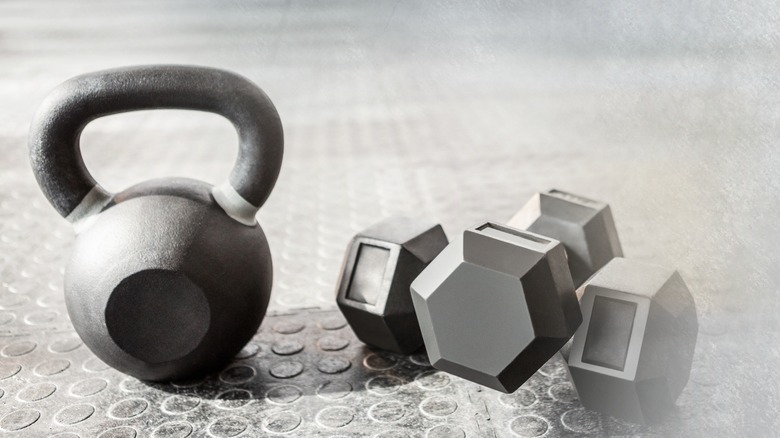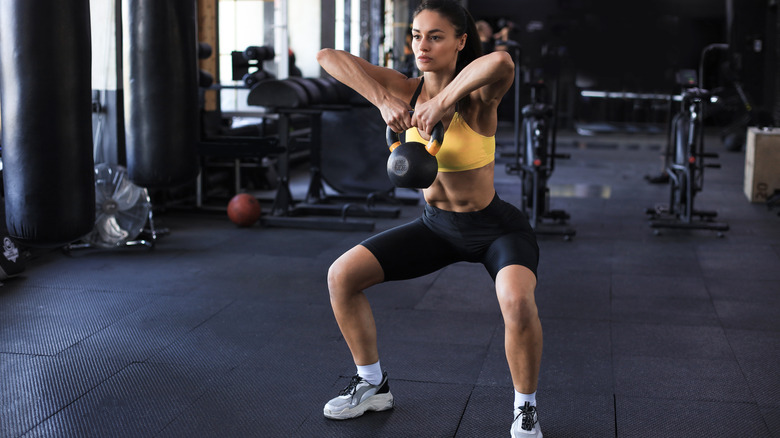Kettlebells Vs. Dumbbells: Which Give You A Better Workout?
We may receive a commission on purchases made from links.
The debate over kettlebells and dumbbells can become a passionate one, especially if you're someone who prefers one over the other (or if you're in the room discussing the merits and pitfalls of each with enthusiastic proponents of either).
Although dumbbells have traditionally been the go-to weights for strength training, kettlebells have seen a rise in popularity in recent years as well. Dumbbells go as far back as the 5th century B.C., with ancient Greeks referring to them as "halteres." Kettlebells, on the other hand, were initially referred to as "girya" and originated in Russia, according to International Kettlebell and Fitness Federation (IKFF) founder Steve Cotter's book, "Kettlebell Training." They started their journey as tools used to weigh goods and only became part of physical training in more recent decades.
Both dumbbells and kettlebells offer benefits when it comes to strength training, but there are fundamental differences in both kinds of fitness equipment that influence your workout. Maybe you're new to incorporating weights into your fitness regime and you're wondering which will give you a better workout. Or, perhaps you're thinking about mixing things up and moving from one kind of weight-based training to another. Here are some things to consider.
Both dumbbells and kettlebells have their own merits and limitations
At first glance, kettlebells and dumbbells look very different. With a dumbbell, you'll see a handle with space for one hand and the weight equally concentrated on both sides of it, whereas a kettlebell will have the weight at the bottom of the handle, which can be grasped by one or two hands depending on your preference. Personal trainer and coach Marvin Nixon tells Ladder that where the weight is located and how your hands move while holding the handle has a bearing on the intensity and movement of your workout.
Grip strength and stability become factors too. A dumbbell typically offers more stability because of how the weight is distributed, making them easier to use, whereas a kettlebell is an ideal fitness tool for those looking for more fluid movements that improve grip strength. Dumbbells allow for more a concentrated workout targeting specific muscle groups. With kettlebells, since you're going to be focusing on gripping the handle with the weight pulling downward, you may end up working the secondary muscles more.
When it comes to versatility and range of motion, kettlebells have a lot more to offer than dumbbells, per Kettlebell Emma. You have to activate your core and engage your entire body in order to get the best of the dynamic movements. In contrast, dumbells can be used while stationary.
Ultimately, it comes down to your fitness goals and personal preference
Kettlebells vs. dumbbells — which give you a better workout? The answer really lies in your personal preference and what you're trying to accomplish with your workout. Certified trainer and nutrition coach Katie Prendergast tells Ladder that kettlebells are ideal for those looking for weight loss and toning. Since your entire body is engaged and moving during kettlebell-specific exercises, you're bound to burn more calories. They're also great movements that mimic everyday life chores you might be performing, such as lifting grocery bags or picking up your children. This makes them excellent for functional training. You will also improve your grip strength by learning to manoeuver a cast iron weight in fluid and explosive ways.
If you're new to weightlifting or if your goal is to focus on specific muscle groups and build them up over time, dumbbells might be the way to go. In fact, a study published in the Journal of Strength and Conditioning Research notes that dumbbells offered more in the way of strength training than kettlebells in a six-week period. Dumbbells also force you to focus on balance and control with each movement. There are some dumbbell sets you can get to start things off at home.
Ultimately, incorporating dumbells and kettlebells in your workouts will give you a well-rounded circuit that improves strength, balance, and overall fitness.


